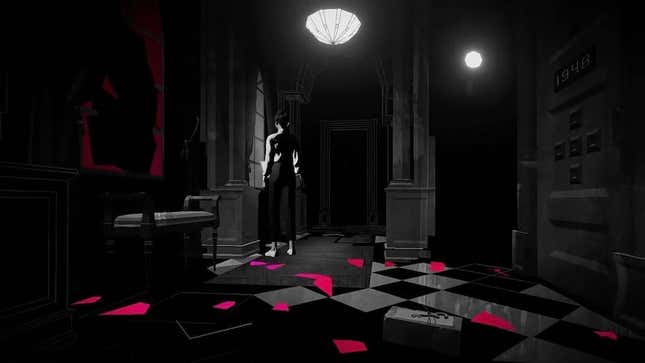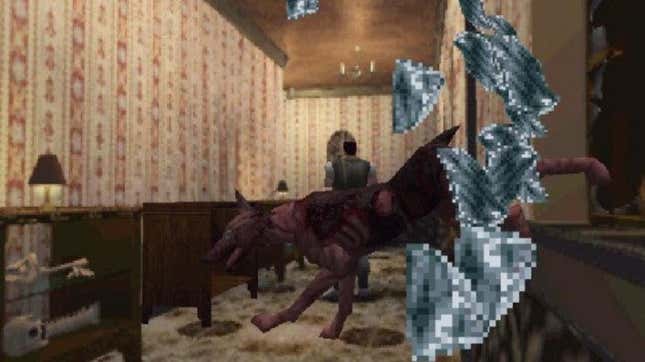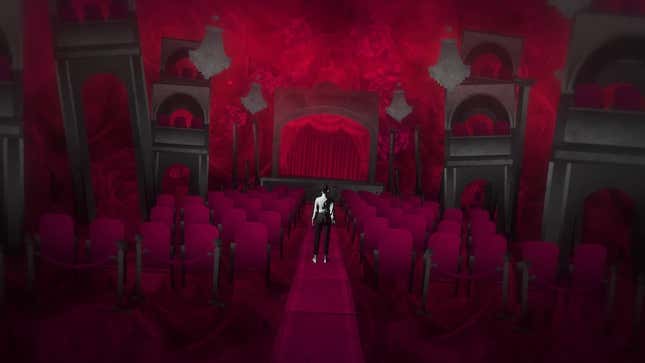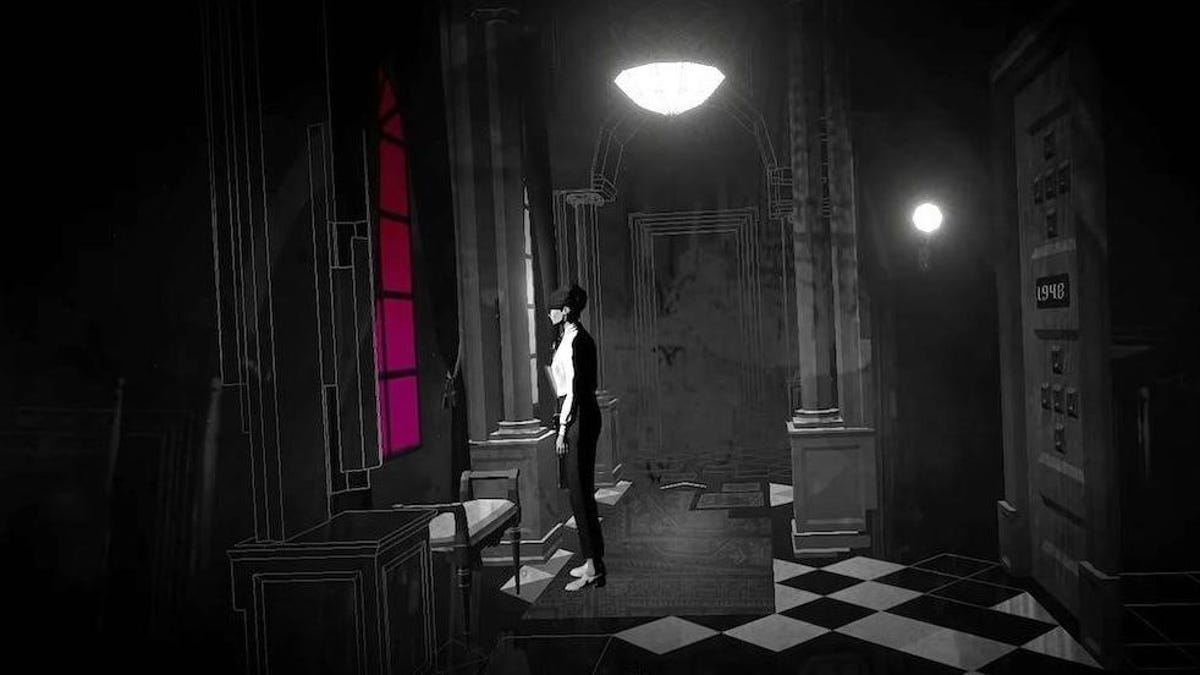Lorelei and the Laser Eyes, the incredible new release from developer Simogo, is not a horror game. It’s a cerebral puzzle game that tests your in-game and real-world knowledge as you progress through a series of complex challenges. It is, however, full of eerie vibes that could convince you something is waiting to jump out at you at every turn, even if they (almost) never do. In fact, I can only think of one real jumpscare, but that one moment might be Lorelei’s best, and it’s straight out of Resident Evil.
On the second floor of the game’s abandoned luxury hotel, there is a hallway, and in that hallway, there is a red window. Lorelei is a monochromatic game bathed in shades of grey, but there are pops of magenta in important locations. This red window gets your attention, enticing you to interact with it. As in a museum, there is a small plaque detailing what the window is—because it’s not just a window, it’s performance art. “Red Window About To Break” is the title of the piece, a work by the mysterious character Renzo Nero. A little blurb explains the “strange logic” behind the piece, which is said to embody the idea that destruction can be art. It’s one of dozens of bits of text you read and then log away. Once exiting out of the blurb, however, something happens—the window breaks.

It breaks in a cacophonous moment that shatters the game’s almost tranquil silence. A brick is lobbed through it from the outside, sending red shards across the floor of the hallway. When, at around midnight one evening, I reached this moment during my playthrough, I screamed at the top of my lungs (sorry to my neighbors). For context, I love horror games and am not prone to getting truly scared by most games’ attempts to do so. And now, the thing that gets me is a simple brick crashing through glass. The worst part is the game told me it was going to happen and it still got me. Even worse, I’ve seen this trick before, because it’s almost directly lifted from the original Resident Evil, in which a zombie dog suddenly crashes through a window and attacks you.
Before this, Lorelei convinces you that something like this will never happen. Before this moment, it has no true scares. The closest it gets is maze-headed men in suits that slowly follow you through rooms at certain points which, while eerie and menacing, aren’t monsters that can kill you in the traditional sense. The game requires that you confront them head-on, at which point you are faced with yet another puzzle to solve. The overwhelming majority of the game is a quiet introspective experience spent looking closely at items while you scribble possible solutions in a notebook.

I wasn’t expecting to be shocked out of my relative, puzzle-induced comfort like this. In retrospect, though, even given that the game had no true scares before the window, I should have been expecting something like this to happen since it plays on Resident Evil tropes so much. The abandoned hotel in which it’s set feels incredibly close to the Spencer Mansion, and an extended gameplay sequence has players controlling a PS1-inspired game within a game, complete with tank controls. Simogo was putting the Resident Evil connections right in my face. Just like the window scare in Resident Evil, Lorelei was telling me that I could never feel truly safe.
As the initial shock of the moment wore off, my scream transformed into something else: laughter. That’s because in addition to being a jumpscare, “Red Window About To Break” is a joke. It reminds me of the Arrested Development dead dove meme. The game literally told me the window would break; what else did I expect? After this point, every time I walked back through this hallway, the red shards of glass on the floor reminded me of the moment and I had to laugh at myself. At least I can find solace in the fact that I’m not alone in my reaction, TheGamer’s Tessa Kaur admits that they dropped their Switch when the brick came flying through the window.

There’s a beauty to how well “Red Window About To Break” works in the larger context of Lorelei. As stated in the artwork’s blurb, the piece is a collaborative performance between brick, window, artist, and audience. The artist presents the work by lobbing the brick through the window, but it only becomes the professed piece of art in being observed by the audience, or in this case, the player. If a window breaks and nobody is there to see it, did it even break? This same idea of the interaction between player and developer is explored in the game at large. Puzzles and narrative threads are presented to you by the developer but they can only reach their full potential when engaged with by you, the player. It conceives of interactivity as a sort of dance between both parties.
For a well-crafted puzzle box whose final challenge is a test of how well you have been paying attention, it feels more than apt. You complete Lorelei and the Laser Eyes by fully engaging with its world on the terms the developers set. By the end, it feels like you are throwing a brick through a window, shattering the game wide open.
.

